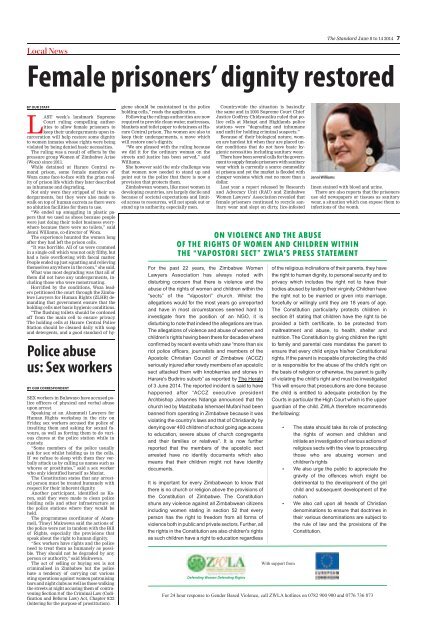Create successful ePaper yourself
Turn your PDF publications into a flip-book with our unique Google optimized e-Paper software.
Local News<br />
<strong>The</strong> <strong>Standard</strong> <strong>June</strong> 8 to 14 <strong>2014</strong> 7<br />
Female prisoners’ dignity restored<br />
BY OUR STAFF<br />
Police abuse<br />
us: Sex workers<br />
BY OUR CORRESPONDENT<br />
SEX workers in Bulawayo have accused police<br />
officers of physical and verbal abuse<br />
upon arrest.<br />
Speaking at an Abammeli Lawyers for<br />
Human Rights workshop in the city on<br />
Friday, sex workers accused the police of<br />
insulting them and asking for sexual favours,<br />
as well as forcing them to do various<br />
chores at the police station while in<br />
custody.<br />
“Some members of the police usually<br />
ask for sex whilst holding us in the cells.<br />
If we refuse to sleep with them they verbally<br />
attack us by calling us names such as<br />
whores or prostitutes,” said a sex worker<br />
who only identified herself as Maziat.<br />
<strong>The</strong> Constitution states that any arrested<br />
person must be treated humanely with<br />
respect for their inherent dignity.<br />
Another participant, identified as Karen,<br />
said they were made to clean police<br />
holding cells and other infrastructure at<br />
the police stations where they would be<br />
held.<br />
<strong>The</strong> programmes coordinator of Abammeli,<br />
Tineyi Mukwewa said the actions of<br />
the police were not in tandem with the Bill<br />
of Rights, especially the provisions that<br />
speak about the right to human dignity.<br />
“Sex workers have rights and the police<br />
need to treat them as humanely as possible.<br />
<strong>The</strong>y should not be degraded by any<br />
person or authority,” said Mukwewa.<br />
<strong>The</strong> act of selling or buying sex is not<br />
criminalised in Zimbabwe but the police<br />
have a tendency of carrying out various<br />
sting operations against women patronising<br />
bars and night clubs as well as those walking<br />
the streets at night accusing them of contravening<br />
Section 8 of the Criminal Law (Codification<br />
and Reform Law) Act, Chapter 9:23<br />
(loitering for the purpose of prostitution).<br />
LAST week’s landmark Supreme<br />
Court ruling compelling authorities<br />
to allow female prisoners to<br />
keep their undergarments upon incarceration<br />
will help restore some dignity<br />
to women inmates whose rights were being<br />
violated by being denied basic necessities.<br />
<strong>The</strong> ruling was a result of efforts by the<br />
pressure group Women of Zimbabwe Arise<br />
(Woza) since 2011.<br />
While detained at Harare Central remand<br />
prison, some female members of<br />
Woza came face-to-face with the grim reality<br />
of prison life which they later described<br />
as inhumane and degrading.<br />
Not only were they stripped of their undergarments,<br />
but they were also made to<br />
walk on top of human excreta as there were<br />
no ablution facilities for them to use.<br />
“We ended up smuggling in plastic papers<br />
that we used as shoes because people<br />
were just doing their toilet business everywhere<br />
because there were no toilets,” said<br />
Jenni Williams, co-director of Woza.<br />
<strong>The</strong> experience haunted the women long<br />
after they had left the prison cells.<br />
“It was horrible. All of us were crammed<br />
in a single cell which was not only filthy, but<br />
had a hole overflowing with faecal matter.<br />
People ended up just squatting and relieving<br />
themselves anywhere in the room,” she said.<br />
What was most degrading was that all of<br />
them did not have any undergarments, including<br />
those who were menstruating.<br />
Horrified by the conditions, Woza leaders<br />
petitioned the court through the Zimbabwe<br />
Lawyers for Human Rights (ZLHR) demanding<br />
that government ensure that the<br />
holding cells met basic hygienic conditions.<br />
“<strong>The</strong> flushing toilets should be cordoned<br />
off from the main cell to ensure privacy.<br />
<strong>The</strong> holding cells at Harare Central Police<br />
Station should be cleaned daily with soap<br />
and detergents, and a good standard of hygiene<br />
should be maintained in the police<br />
holding cells,” reads the application.<br />
Following the rulings authorities are now<br />
required to provide clean water, mattresses,<br />
blankets and toilet paper to detainees at Harare<br />
Central prison. <strong>The</strong> women are also to<br />
keep their undergarments, a move which<br />
will restore one’s dignity.<br />
“We are pleased with the ruling because<br />
we did it for the ordinary woman on the<br />
streets and justice has been served,” said<br />
Williams.<br />
She however said the only challenge was<br />
that women now needed to stand up and<br />
point out to the police that there is now a<br />
provision that protects them.<br />
Zimbabwean women, like most women in<br />
developing countries, are largely docile and<br />
because of societal expectations and limited<br />
access to resources, will not speak out or<br />
stand up to authority, especially men.<br />
Countrywide the situation is basically<br />
the same and in 2005 Supreme Court Chief<br />
Justice Godfrey Chidyausiku ruled that police<br />
cells at Matapi and Highlands police<br />
stations were “degrading and inhumane<br />
and unfit for holding criminal suspects.”<br />
Because of their biological nature, women<br />
are hardest hit when they are placed under<br />
conditions that do not have basic hygienic<br />
necessities including sanitary wear.<br />
<strong>The</strong>re have been several calls for the government<br />
to supply female prisoners with sanitary<br />
wear which is currently a scarce commodity<br />
at prisons and yet the market is flooded with<br />
cheaper versions which cost no more than a<br />
dollar.<br />
Last year a report released by Research<br />
and Advocacy Unit (RAU) and Zimbabwe<br />
Women Lawyers’ Association revealed that<br />
female prisoners continued to recycle sanitary<br />
wear and slept on dirty, lice-infested<br />
For the past 22 years, the Zimbabwe Women<br />
Lawyers Association has always noted with<br />
disturbing concern that there is violence and the<br />
abuse of the rights of women and children within the<br />
“sects” of the “Vapostori” church. Whilst the<br />
allegations would for the most years go unreported<br />
and have in most circumstances seemed hard to<br />
investigate from the position of an NGO, it is<br />
disturbing to note that indeed the allegations are true.<br />
<strong>The</strong> allegations of violence and abuse of women and<br />
children's rights having been there for decades where<br />
confirmed by recent events which saw “more than six<br />
riot police officers, journalists and members of the<br />
Apostolic Christian Council of Zimbabwe (ACCZ)<br />
seriously injured after rowdy members of an apostolic<br />
sect attacked them with knobkerries and stones in<br />
Harare's Budiriro suburb” as reported by <strong>The</strong> Herald<br />
of 3 <strong>June</strong> <strong>2014</strong>. <strong>The</strong> reported incident is said to have<br />
happened after “ACCZ executive president<br />
Archbishop Johannes Ndanga announced that the<br />
church led by Madzibaba Ishemael Mufani had been<br />
banned from operating in Zimbabwe because it was<br />
violating the country's laws and that of Christianity by<br />
denying over 400 children of school going age access<br />
to education, severe abuse of church congregants<br />
and their families or relatives”. It is now further<br />
reported that the members of the apostolic sect<br />
arrested have no identity documents which also<br />
means that their children might not have identity<br />
documents.<br />
It is important for every Zimbabwean to know that<br />
there is no church or religion above the provisions of<br />
the Constitution of Zimbabwe. <strong>The</strong> Constitution<br />
shuns any violence against all Zimbabwean citizens<br />
including women stating in section 52 that every<br />
person has the right to freedom from all forms of<br />
violence both in public and private sectors. Further, all<br />
the rights in the Constitution are also children's rights<br />
as such children have a right to education regardless<br />
Defending Women Defending Rights<br />
With support from<br />
Jenni Williams<br />
linen stained with blood and urine.<br />
<strong>The</strong>re are also reports that the prisoners<br />
use old newspapers or tissues as sanitary<br />
wear, a situation which can expose them to<br />
infections of the womb.<br />
ON VIOLENCE AND THE ABUSE<br />
OF THE RIGHTS OF WOMEN AND CHILDREN WITHIN<br />
THE “VAPOSTORI SECT” ZWLA'S PRESS STATEMENT<br />
of the religious inclinations of their parents, they have<br />
the right to human dignity, to personal security and to<br />
privacy which includes the right not to have their<br />
bodies abused by testing their virginity. Children have<br />
the right not to be married or given into marriage,<br />
forcefully or willingly until they are 18 years of age.<br />
<strong>The</strong> Constitution particularly protects children in<br />
section 81 stating that children have the right to be<br />
provided a birth certificate, to be protected from<br />
maltreatment and abuse, to health, shelter and<br />
nutrition. <strong>The</strong> Constitution by giving children the right<br />
to family and parental care mandates the parent to<br />
ensure that every child enjoys his/her Constitutional<br />
rights. If the parent is incapable of protecting the child<br />
or is responsible for the abuse of the child's right on<br />
the basis of religion or otherwise, the parent is guilty<br />
of violating the child's right and must be investigated<br />
This will ensure that prosecutions are done because<br />
the child is entitled to adequate protection by the<br />
Courts in particular the High Court which is the upper<br />
guardian of the child. ZWLA therefore recommends<br />
the following:<br />
<strong>The</strong> state should take its role of protecting<br />
the rights of women and children and<br />
initiate an investigation of various actions of<br />
religious sects with the view to prosecuting<br />
those who are abusing women and<br />
children's rights<br />
We also urge the public to appreciate the<br />
gravity of the offences which might be<br />
detrimental to the development of the girl<br />
child and subsequent development of the<br />
nation.<br />
We also call upon all heads of Christian<br />
denominations to ensure that doctrines in<br />
their various denominations are subject to<br />
the rule of law and the provisions of the<br />
Constitution.<br />
For 24 hour response to Gender Based Violence, call ZWLA hotlines on 0782 900 900 and 0776 736 873


















